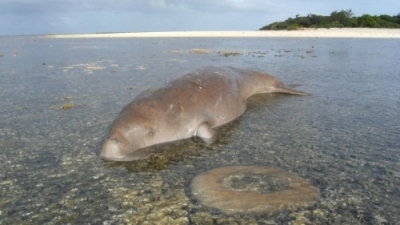Go back to Threatened and Migratory Species

ON THIS PAGE
Stranded whales and dolphins are a valuable source of information on species identity and diversity, particularly for many of the remote and inaccessible regions of the South Pacific. To improve understanding of whale and dolphin populations in the Pacific, and possibly improve understanding of their threats, a concerted effort is needed to document strandings and incidental sightings. This is an integral component of the Whale and Dolphin Action Plan 2022-2026.
SPREP has partnered with WildMe and the South Pacific Whale Research Consortium to provide a platform to improve the documentation of whale, dolphin, and dugong strandings among nations and territories of SPREP.
A link to a website, called Flukebook, is provided which hosts a project called Strandings of Oceania.. The website has a user-submitted form for a stranding event that can be used by anyone with access to the Internet, including members of the public, government agencies and representatives of non-governmental organisations. This aims to provide a standardised reporting system across the Pacific and complement existing national data sets.
Flukebook is available in both English and French.
How to use Flukebook to submit, view, and manage data
Click here to visit Flukebook
Submitting data
Download guidance for submitting data to the Strandings of Oceania database on Flukebook.
To assist with recording data in the field, a stranding form is available to print. Please copy this data into Flukebook yourself or send information and photos via email to SPREP with the text “Stranding” in the subject line.
Data submitted to Flukebook will be administered by SPREP and the South Pacific Whale Research Consortium who will add reported strandings to the project and confirm species IDs.
Viewing and managing data
You can download the data from the Pacific Environment Portal.
To view, analyse or download data the data on Flukebook, you need an account, contact Karen Baird.
Guidance on using the Flukebook interface to view, analyse, and download data is available here.
Webinar - 12 October 2023
This webinar was hosted by SPREP’s Threatened and Migratory Species Team to share how we can use Flukebook to collate and manage data of strandings and incidents of whales, dolphins, and dugongs throughout the SPREP region.
SPREP’s Migratory Marine Species Conservation Officer, Hannah Hendriks, presented on the following:
- marine mammals of the Pacific
- what is a stranding?
- summary of strandings in the region
- introduction to Flukebook and the database
Attendees were also shown a tutorial of how to use Flukebook to search and enter data.
View a recording of the webinar below and download the slides:
About Flukebook
Flukebook is a free, online resource, established to strengthen the global conservation of whales and dolphins. A catalyst for collaboration, Flukebook enables researchers to manage, share, analyse and archive data via pioneering, user friendly software. Flukebook unites researchers, conservationists and citizen scientists, enables connections with individual animals, and provides robust data to inform conservation of marine mammals and their habitats.
Information for researchers using the platform is available on the WildMe website.
Flukebook was designed for photo-identification catalogues using artificial intelligence to perform matches between individuals based on images. This is the only project with a focus on stranded individuals. We would like to thank and acknowledge our Partners, the South Pacific Whale Research Consortium and WildMe in collaborating with SPREP to manage the Strandings of Oceania Database on Flukebook and to the PEW Marine Conservation Fellowship for providing initial funding.
Contact us
Ms. Karen Baird (Threatened and Migratory Species Adviser); or
Ms. Hannah Hendriks (Migratory Marine Species Conservation Officer)